Having potential customers in today’s highly competitive business environment is one of the most significant responsibilities. This makes the Customer Relationship Management (CRM) systems fundamental in helping businesses seek to enhance their relations with the customers and automate their processes. In this guide, our goals are to answer questions like who can get value from CRM systems, why they matter, what their pros are, what they are, and how much do they cost? We will also try to address some of the questions which are frequently asked about CRM.
Who Can Benefit from Using a CRM System?
CRM systems are versatile that can be used by any organization irrespective of its size and type. Here’s who can benefit from using a CRM system:
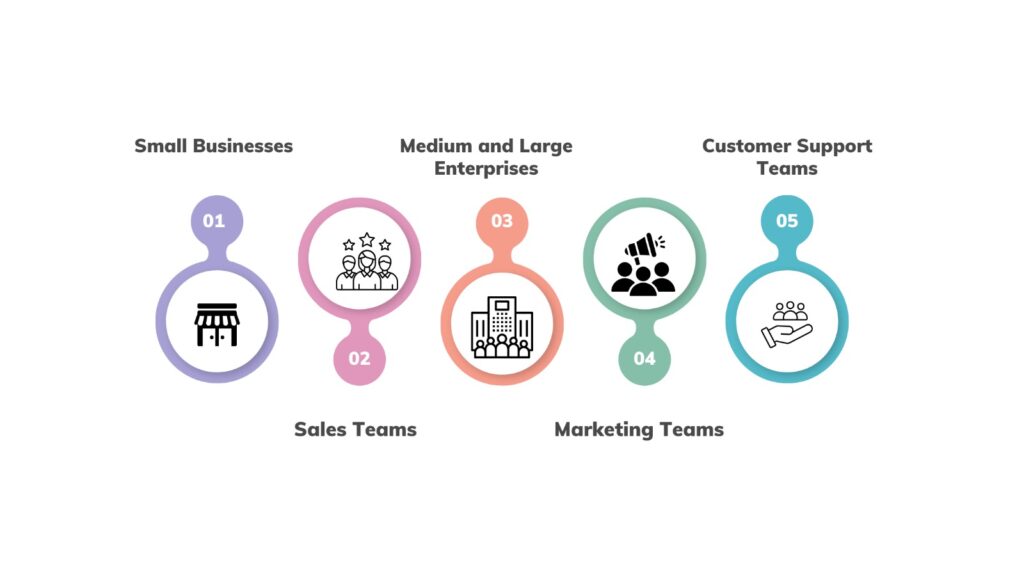
- Small Businesses: For small businesses, use of CRM systems assist in centralizing and organizing customer details with the added ability to interact with such parties though it may not require so much outlay. Small businesses are usually managed by their owners, meaning that these people are involved in a number of different processes; thus, a CRM system is useful as it centralizes customer data and minimizes routine work.
- Medium and Large Enterprises: Medium and large firms with elaborated processes and numerous customers to attend to consider CRM systems as essential. These businesses are likely to have several departments and several teams and therefore having one system that coordinates several functions is desirable.
- Sales Teams: Another one is that sales teams always rely on CRM systems. These tools assist in identifying leads and storing all possible sales channels and closing these more efficiently. Implementation of CRM systems helps to provide clear vision to the sales professionals along with real time what actions of the customer are important, who they should follow-up and hence improving the overall sales metrics.
- Marketing Teams: It helps the marketing teams in enhancing their campaigns and strategies that they want to execute. By rising customer characteristics like between age, gender, or purchase behavior, CRM Sy stems enables marketers to design, launch and measure sweetening campaigns to ensure the effectiveness of marketing communications.
- Customer Support Teams: For customer support departments, CRM systems are the tools to address the customers’ questions and concerns. It records communication with clients such as the tickets issued and received or any other form of communication with the customers.
Why is a CRM System Important for Your Business?
CRM systems are crucial for modern businesses for several reasons: CRM systems are crucial for modern businesses for several reasons:
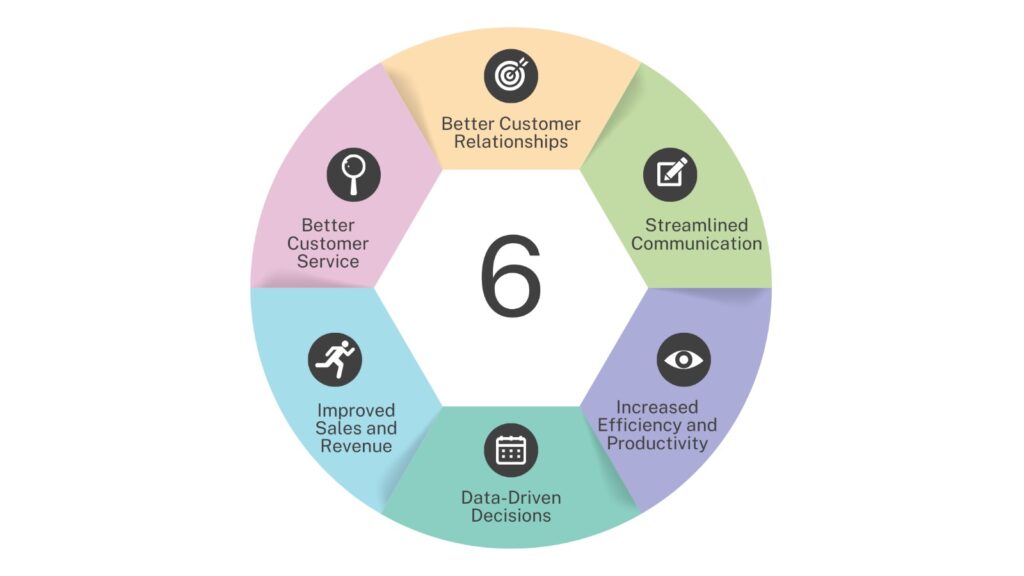
- Better Customer Relationships: CRM systems are used to maintain healthy and long term customer relations by compiling all customer related information in a single system. This offers businesses a total picture of customers, their behaviors, and their past communications, making them better placed to market themselves and meet that next need because they know what that need is.
- Streamlined Communication: Customer relations entail the ability to communicate well to the customers. CRM systems capture all forms of communication such as email messages, voice communication and meetings and therefore does not leave out any form of interaction. This reduces the chances of confusion, allows one to follow up promptly and give the customers a similar or the same experience as earlier.
- Increased Efficiency and Productivity: Many mundane activities such as data entry and follow up reminders can be handled by the CRMs thus eliminating the chances of making mistakes. The above automation assist companies to run their operations more efficiently and frees up personnel’s to focus on core business functions.
- Data-Driven Decisions: In the customer relationship management, organizations are able to gain insight on analytics and reporting. They can use it to identify the behavioral patterns of the customers, the flow of sales or the effectiveness of various campaigns to enhance the decisions that are made.
- Improved Sales and Revenue: They assist in increasing sales by tracking leads, recording sales activities and finally making a forecast on future sales. They allow sales teams to see good leads and prospective customers, study them and channel efforts thus contributing to revenues.
- Better Customer Service: Product quality may be important but providing quality services to the customers is even more important since it helps retain customers. CRM solutions make it possible for the support teams to access valuable customer data, which enables them to be more helpful meeting clients’ needs faster and making them happier.
What Are the Benefits of CRM?
Various facets of CRM systems contain a lot of advantages that can revolutionize the way organizations and their clients work. Here are some key benefits:
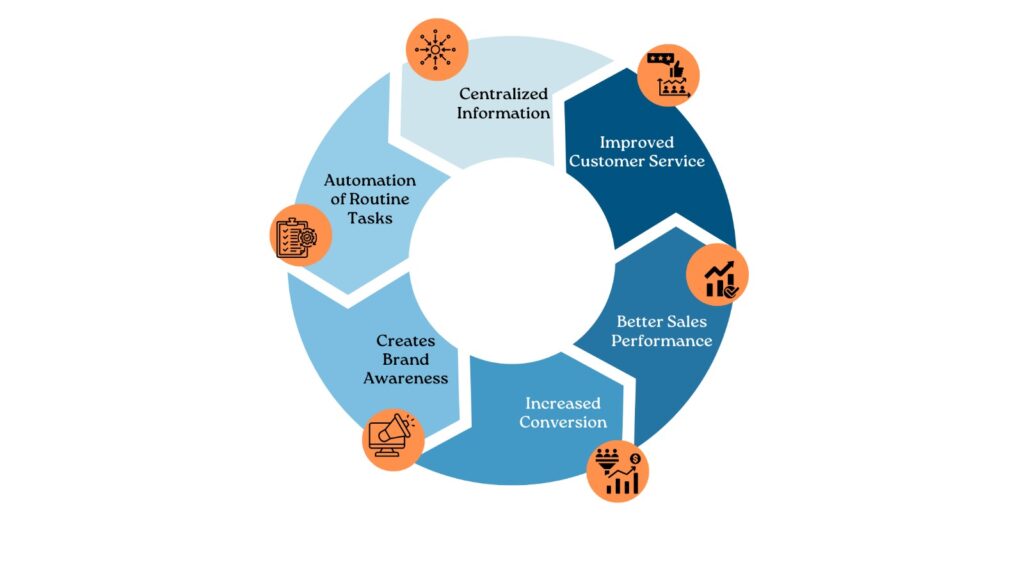
- Centralized Information: CRM systems gather all information related to the customer under one database including his/her contact information and buying records. This centralization help to ensure that every one within the company parades accurate and current information that is more conducive to decision making as well as streamlining communication and other business interactions.
- Improved Customer Service: Combining customer relationship management with customer support greatly improves the work of support teams and delivers the big picture of interactions with customers. It also makes it easier for a firm to provide more customers with support, realize high satisfaction and loyalty from customers in return.
- Better Sales Performance: Some of the features include lead management where potential customers are tracked through the selling process. Overall these tools assist the sales teams in identifying sales opportunities, leads, and markets, thus improving the performance of lead generation and the closing of deals to generate more revenues.
- Effective Marketing Strategies: CRM systems contain information about client activity that can be utilized by the marketing specialists in developing successful campaigns and evaluating their effectiveness. Customer needs therefore should be better understood to help in coming up with proper marketing strategies and improved outcomes.
- Increased Collaboration: CRM systems enhance teamwork since it becomes easier for everyone in the team to use the system to access information about the customer and track such interactions. They must be able to communicate better, collaborate and provide a uniform service to the customers.
- Automation of Routine Tasks: Integration in CRM systems can help to minimize manual work with such tasks as entry of data and follow-ups. This makes work easier and enables the various departments to work towards more critical tasks.
- Scalability and Flexibility: One thing that is very clear about CRM systems is the fact that they are always expandable in nature to match the growth of the business. They can be expanded according to the needs of business development and tailored according to the requirements and work scenarios.
What Does a CRM System Do?
CRM is an all-rounded tool, which has been developed with the aim of enhancing and organizing relationships between the organization and the customer. Here’s what a CRM system typically does:
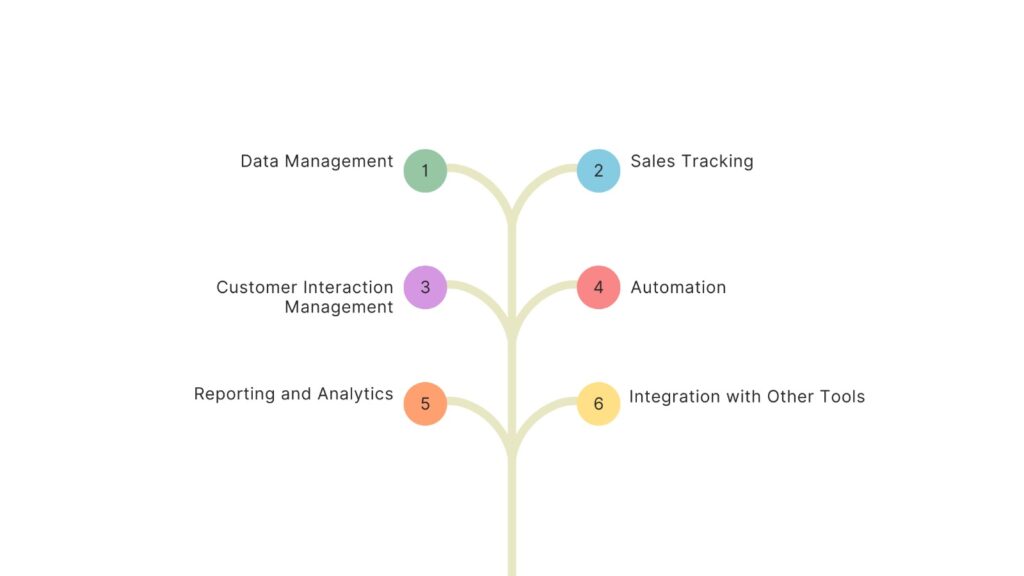
- Data Management: CRM systems store data that concerns the customers such as their details and their previous communications with the company. It should be noted that this central database allows the proper tracking of relationships within a business environment.
- Sales Tracking: It used for tracking the leads of the sales personnel, managing sales funnels and also performance evaluation. They afford knowledge about sales undertakings and about anticipated sales.
- Customer Interaction Management: CRM systems capture various forms of communications that a firm may have with its clients including emails and telephone calls. Such history is beneficial for businesses as it allows the precise and speedy reaction to the issue under consideration.
- Automation: Organization daily CRM operations involve the automation of simple tasks such as data inputting, follow-ups among others, the CRM systems make it easy to minimize on the work involved in the manual input of data.
- Reporting and Analytics: All the CRM systems come equipped with a reporting and analysis tool that can be used to draw a customer behavior pattern, sales made or marketing practices adopted.
- Integration with Other Tools: Most of the CRM solutions are synchronized with other applications such as e-mail, calendar and other organizational instruments to boost productivity.
How Much Does a CRM Cost?
The cost of CRM system can be estimated on the basis of features offered, number of users to be involved and type of deployment. Here’s a breakdown of what affects CRM pricing:
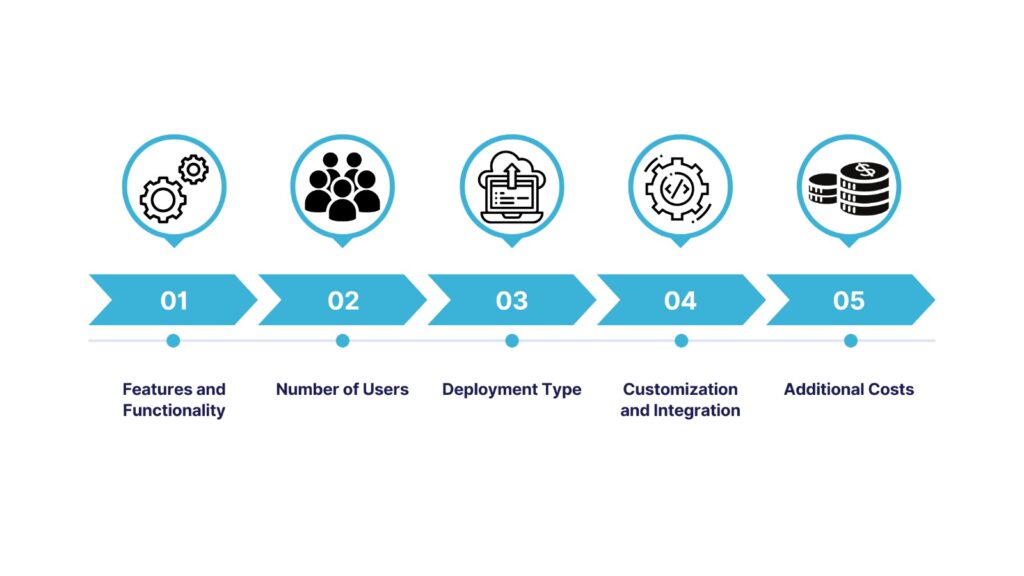
- Features and Functionality: There are the basic ones that are relatively cheaper than the others, especially those with the additional features such as configuration and analysis. If it is still a problem for you to decide on a particular CRM, then it would be better to focus on your individual requirements and the amount of money that you are ready to spend on the CRM.
- Number of Users: The degree of CRM expense may well depend on user volume. Some providers have also agreed that prices depend on the number of customers using their services; the more the customers, the higher the price.
- Deployment Type: CRM systems are of two types, namely the cloud CRM and the customer premises CRM. Cloud based models are normally paid on a subscription basis, with options to pay monthly or annually, while on the other hand on-premise based models have an upfront cost of acquisition in addition to the need to maintain the systems.
- Customization and Integration: The implementation cost increases with the need to tailor and incorporate a CRM system into the organization. This may result in additional development effort and initial preparation.
- Additional Costs: Costs, such as training, support and eventual equipment upgrades must also be taken into consideration. Integrations can either be offered in the monthly rate offered by the CRM provider or be available as an additional cost.
Entry level in price for basic CRM systems is $10-$20 per user per month. Higher end solutions on the other hand may cost between $50-$150 per user per month or may be even more. When the time comes to selecting a CRM, it is pertinent that you make a comparison between these various options available and select that which is most appropriate for your business needs definitely having consideration to the aspect of the cost.
Frequently Asked Question (FAQs)
The main purpose of a CRM system is to manage and improve customer interactions by centralizing data, streamlining communication, and automating tasks. This helps businesses build better relationships with customers and run more efficiently.
Yes, most CRM systems can be customized to match your specific business needs. This might include changing workflows, fields, and reports to fit your processes.
Implementation time can vary. It depends on the complexity of the CRM system, the size of your organization, and how much customization is needed. It can take from a few weeks to several months.
Yes, CRM systems are suitable for businesses of all sizes. There are CRM solutions for small startups and large enterprises, so businesses of any size can benefit from them.
When selecting a CRM system, consider features, ease of use, integration options, scalability, customer support, and cost. Choose a CRM that aligns with your business needs and budget.
Conclusion
Customer Relationship Management (CRM) systems have become essential tools for businesses aiming to improve their customer interactions and streamline their operations. By providing a centralized platform to manage customer data, automate routine tasks, and gain valuable insights, CRM systems help businesses of all sizes enhance their efficiency and effectiveness.
Whether you’re a small business owner looking to simplify customer management, a sales team striving to boost performance, a marketing department aiming for better campaign results, or a customer support team seeking to provide excellent service, CRM systems offer numerous benefits. They enable you to build stronger customer relationships, streamline communication, make data-driven decisions, and ultimately drive growth and success.

